Salat (Prayer)
Obligation
Prayer is obligatory upon every adult Muslim of sound mind. As far as children are concerned, it is not obligatory on them until they come of age. When children reach the age of 7, parents should urge them to be regular in their Prayers and when they reach the age of 10, they must be admonished if they fail to offer their Prayers regularly. (Sunan Abu Dawud, Kitabus-Salat). Once children reach the age of maturity, it becomes compulsory for them to offer their Prayers.
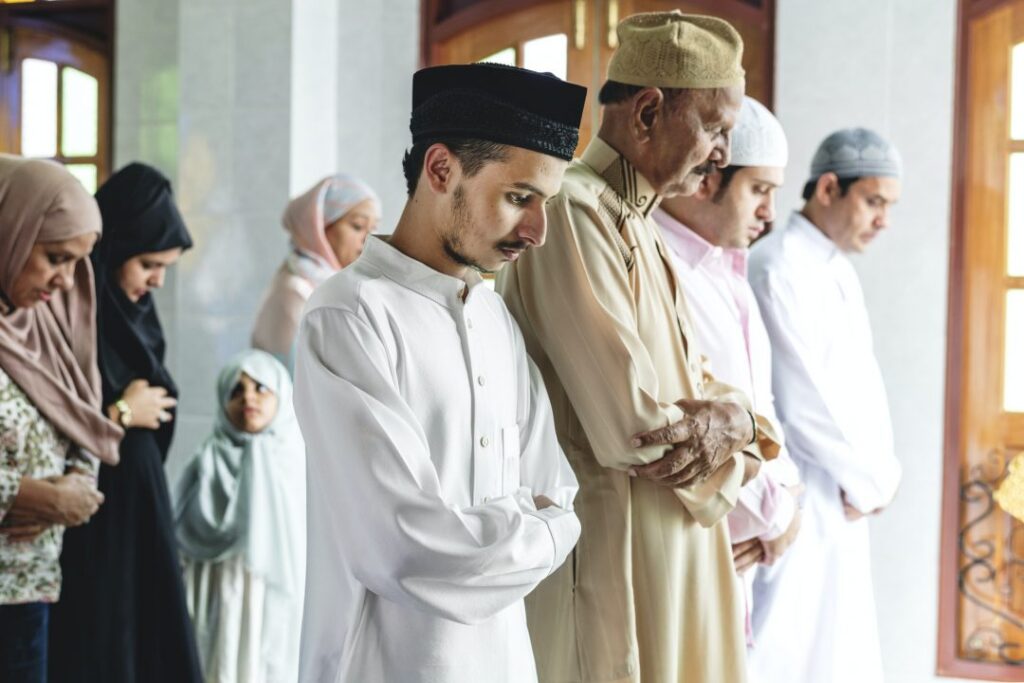
There are five obligatory Prayers every day, and each Prayer consists of units called Rak‘at. The number and type of Rak’at in each prayer are shown in the table below:
| Sunnah | Fard | Sunnah | Nafl | Witr | Nafl | Total | |
|---|---|---|---|---|---|---|---|
| Fajr | 2 | 2 | - | - | - | - | 4 |
| Zuhr | 4 | 4 | 2 | 2 | - | - | 12 |
| Asr | 4 | 4 | - | - | - | - | 8 |
| Maghrib | - | 3 | 2 | 2 | - | - | 7 |
| Isha | 4 | 4 | 2 | 2 | 3 | 2 | 17 |
| Jummah | 4 | 2 | 4+2 | 2 | - | - | 14 |
Fard is an Arabic word which means compulsory or obligatory. It is sinful to leave out a Fard Prayer intentionally, but if such a Prayer is missed through forgetfulness or due to unavoidable circumstances, then the missed Prayer can be offered as soon as one remembers, or whenever possible.
The Holy Prophet ﷺ offered extra Rak‘ats of Prayer in addition to the Fard Prayers. These are called Sunnat Prayers, and offering Sunnat Prayers is considered necessary by all jurists. The willful neglect of Sunnat Prayers is censurable in the sight of Allah.
Apart from Fard and Sunnat, Muslims also offer additional Rak‘at of Prayer called Nafl. These are optional Prayers, but those who voluntarily offer Nafl reap the benefits of Allah’s favors.
For each of the five obligatory Prayers, there is an appointed time fixed in relation to the sun’s position.
- The time for Fajr Prayer begins with dawn and ends just before sunrise.
- The time for Zuhr Prayer begins after the sun has crossed the zenith point and has begun to decline.
- The time for Asr Prayer is when the sun has further advanced in decline and reaches a point nearly halfway between the beginning of decline and sunset, which translates to late afternoon.
- The time for Maghrib Prayer begins immediately after the sun has set and lasts till dusk.
- The time for Isha Prayer begins when dusk has finally disappeared, giving way to the darkness of night.
All Prayers should generally be offered at the beginning of their respective times and not delayed until the time is about to run out.
The word Wudu implies washing some parts of the body in a specific manner as described below. This is a prerequisite which must be fulfilled, otherwise the Prayer will not be considered valid.
Step 1) Wash hands three times with water and then clean your mouth by rinsing three times.
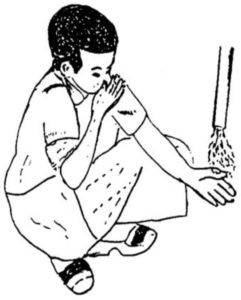
Step 2) Clean the nose internally by pushing a little water into the nostrils three times.
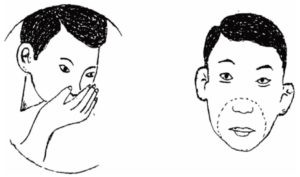
Step 3) Wash the entire face three times.
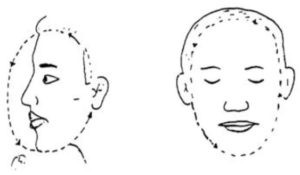
Step 4) Wash both arms, up to and including the elbow, three times each, starting with the right.
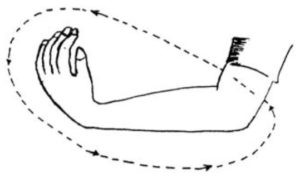
Step 5) After wetting the hands with some water, make a pass over the head with both hands, palms downwards with thumbs outstretched so that almost the whole head is covered by this in a passing motion. At the end of this motion, clean the ears with the tips of the forefingers. The forefinger of the right hand is used for the right ear and the forefinger of the left hand is used for the left ear. The finger tips move along the crevices and grooves of the outside ear and are dipped slightly into the ear holes.

After passing the finger tips around the grooves of the external ear and dipping them into the ear holes, join all fingers together and invert the hands so that your palms are now facing outwards. With the back of the hands, make a pass from the nape of the neck to the front of the neck.

Step 6) Wash the feet up to the ankles inclusive, three times each, beginning with the right.
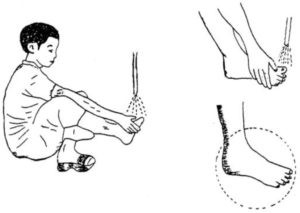
It is essential to offer Prayer while the Wudu is intact. If your Wudu remains intact, then more than one Prayer can be performed just with one Wudu. This means that the state of Wudu is necessary when one performs Prayer, but for each Prayer repetition of Wudu is not necessary if the previous ablution is still valid.
Factors which break the state of Wudu:
- Passing wind.
- Urination even if a drop has passed out.
- Passing stool in however small quantity.
- Sleeping, dozing off to the degree that if one were without a support, one would not be able to keep balance.
- Menstruation and ejaculation.
- About vomiting and bleeding, opinions are divided but minor bleeding from any part of the body by an ordinary cut, etc., or throwing-up of a little food during belching should not be counted as bleeding and vomiting. Otherwise, after vomiting and bleeding, Wudu should be performed again.
In some situations, as described below, Wudu alone is not enough and it is necessary to take a full bath before offering any formal Prayer.
- In Case of Women
- After each menstruation when the flow of blood has completely stopped.
- After childbirth when the bleeding has finally stopped. Note: During these bleeding periods, women are not required to perform formal Prayers.
- In Case of Men and Women
- After seminal ejaculation or orgasm, whether resulting from conjugation or from any other cause. The same applies to night discharges during sleep.
- Sexual contact between man and woman, even without ejaculation and however brief it may be.
Some prerequisites and conditions exist regarding the offering of Prayers. They are as follows:
- The intention to perform a Prayer must be made prior to the beginning of the Prayer.
- The Prayer should be offered within the fixed time allotted for that particular Prayer. However, if it is not possible to perform a Prayer in time due to extenuating circumstances, that Prayer can be offered later but not at forbidden times.
- The body should be clean from all filth and properly covered during the Prayer.
- The place of Prayer must be neat and clean.
- The person must face towards the direction of the Qiblah unless that’s not physically possible due to illness. Qiblah means facing the Ka‘bah in Makkah.
During Prayer, the body should be decently covered, particularly around the private parts. In case of men, this can be defined as an area of the body beginning from the navel down to the end of the knee-cap. According to most schools of Jurisprudence, men should also cover their heads when praying. Women should cover their entire body, including their arms, but excluding the hands and feet.
Adhan is widely recognized as the call to Prayer all over the world. The Mu’adhdhin, the person who says the Adhan, should stand in a prominent position with his face turned towards the Qiblah. The Mu’adhdhin should touch his ears with his index fingers, right finger touching the right ear and the left finger touching the left, and recite the Adhan in a loud voice. He should turn his face towards the right when saying the words, Hayya ‘alas-Salah and turn his face to the left while reciting the words Hayya ‘alal-Falah.
The words of Adhan are as follows:
ٱللَّٰهُ أَكْبَرُ
Transliteration:
Allahu Akbar (four times)
Translation:
Allah is the Greatest. (four times)
أَشْهَدُ أَن لَّا إِلَٰهَ إِلَّا ٱللَّٰهُ
Transliteration:
Ashhadu alla ilaha illallah (two times)
Translation:
I bear witness that there is none worthy of worship except Allah. (two times)
أَشْهَدُ أَنَّ مُحَمَّدًا رَسُولُ ٱللَّٰهِ
Transliteration:
Ashhadu anna Muhammadar Rasulullah (twice)
Translation:
I bear witness that Muhammad is the Messenger of Allah. (two times)
حَيَّ عَلَى ٱلصَّلَاةِ
Transliteration:
Hayya ‘alas-Salah (two times)
Translation:
Come to Prayer. (two times)
حَيَّ عَلَى ٱلْفَلَاحِ
Transliteration:
Hayya ‘alal-Falah (two times)
Translation:
Come to success. (two times)
ٱللَّٰهُ أَكْبَرُ
Transliteration:
Allahu Akbar (two times)
Translation:
Allah is the Greatest. (two times)
لَا إِلَٰهَ إِلَّا ٱللَّٰهُ
Transliteration:
La ilaha illallah
Translation:
There is none worthy of worship except Allah.
During the Adhan for Fajr Prayer, the following words are also recited twice after saying, Hayya ‘alal-Falah:
ٱلصَّلَاةُ خَيْرٌ مِنَ ٱلنَّوْمِ
Transliteration:
Assalatu khairum-minan-naum (two times)
Translation:
Prayer is better than sleep. (two times)
After completion of the Adhan, listeners should recite the following prayer:
اَللّهُمَّ رَبَّ هَذِهِ الدَّعوَةِ التَّامَّةِ، وَالصَّلَاةِ القَائِمَةِ، آتِ مُحَمَّدًانِ الوَسِيلَةَ وَالفَضِيلَةَ، وَابعَثهُ مَقَامًا مَّحمُودَانِ الَّذِي وَعَدتَهُ إِنَّكَ لَا تُخلِفُ المِيعِاد
Transliteration:
Allahumma Rabba hadhihidda‘watit-tammati wassalatil qa’imati, ati Muhammada-nil-wasilata wal-fadilata waddarajatar-rafi‘ata, wab‘ath-hu maqamam-mahmuda-nilladhi wa’attahu. Innaka la tukhliful mi‘ad. (Bukhari, Kitabul-Adhan)
Translation:
O Allah, Lord of this Perfect Call, and of the Congregational Prayer, make Muhammad ﷺ a means of our access to You, and bless him with excellence and the lofty office, and grant him the most exalted station You have promised him. Verily, You do not go back on Your promise.
The Iqamah is recited when a congregational Prayer is about to commence. This is an indication that the Imam has taken his place facing towards the Ka‘bah and is ready to begin the Prayer. The Iqamah is a shorter version of the Adhan. The person who has recited the Adhan should also recite the Iqamah. (Sunan Tirmidhi, Abwabus-Salat, Bab Ma Ja‘a anna man Adhdhana fa huwa yuqim). However, in certain cases, another person may recite the Iqamah with the permission of the Mu’adhdhin or the Imam.
Other differences between the Adhan and the Iqamah are as follows:
- The Adhan is called aloud while the Iqamah is recited in a low tone.
- During the recitation of Iqamah, the fingers are not raised so as to touch the ears as is done in Adhan; instead the arms are left hanging straight by one’s sides.
- The sentence, Assalatu khairum-minan-naum is not recited in the Iqamah for Fajr prayer.
- During the Iqamah the sentence Qad qamatis-Salat, i.e. Salat is ready, is repeated twice after saying, Hayya ‘alal-Falah.
- During the Iqamah, the face is not turned towards the right or to the left when Hayya ‘alas-Salah and Hayya ‘alal-Falah are recited, as is done in the Adhan.
The text of the Iqamah is as follows:
ٱللَّٰهُ أَكْبَرُ ٱللَّٰهُ أَكْبَرُ . أَشْهَدُ أَن لَّا إِلَٰهَ إِلَّا ٱللَّٰهُ . أَشْهَدُ أَنَّ مُحَمَّدًا رَسُولُ ٱللَّٰهِ . حَيَّ عَلَى ٱلصَّلَاةِ . حَيَّ عَلَى ٱلْفَلَاحِ . قَدْ قَامَتِ ٱلصَّلَاةُ . ٱللَّٰهُ أَكْبَرُ ٱللَّٰهُ أَكْبَرُ . لَا إِلَٰهَ إِلَّا ٱللَّٰهُ
Transliteration:
Allahu Akbar, Allahu Akbar; Ashhadu alla Ilaha illallah; Ashhadu anna Muhammadar Rasulullah; Hayya ‘alas-Salah; Hayya ‘alal-Falah; Qad qamatis-Salatu, Qad qamatis-salah; Allahu Akbar, Allahu Akbar; La Ilaha Illallah
Translation:
Allah is the Greatest, Allah is Greatest; I bear witness that there is none worthy of worship except Allah; I bear witness that Muhammad ﷺ is the Messenger of Allah. Come to Prayer. Come to success. Salat is ready. Allah is the Greatest; Allah is the Greatest; There is none worthy of worship except Allah.
The Prayer starts with Takbir-i-Tahrimah, which means raising both hands to the level of earlobes and saying Allahu Akbar (God is the Greatest).
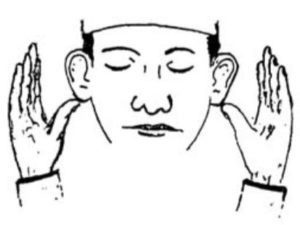
After reciting Allahu Akbar, lower your hands and fold them below the navel so that the right arm is over the left arm. This position is called Qiyam, the Standing Posture.
After saying Takbir-i-Tahrimah, the following glorification called Thana is recited:
سُبْحَانَكَ اللَّهُمَّ وَبِحَمْدِكَ وَتَبَارَكَ اسْمُكَ وَتَعَالَى جَدُّكَ وَلاَ إِلَهَ غَيْرُكَ
Transliteration:
Subhanakallah-humma wa bihamdika wa tabarakasmuka wa ta‘ala jadduka wala ilaha ghairuk.
Translation:
Holy art Thou, O Allah, and all praise is Thine; blessed is Thy name, and exalted is Thy state. There is none worthy of worship except Thee alone. (Tirmidhi, Kitabus-Salat, Ma Yaqulu inda iftahis-Salati; Sunan Nasa’i, Kitabul-Iftah, Babudh-Dhikr bainas-Salat wa bainal-Qira’at.)
Thana is followed by Ta‘awwudh:
أعوذُ بِٱللَّهِ مِنَ ٱلشَّيۡطَٰنِ ٱلرَّجِيمِ
Transliteration:
A‘udhu billahi minash-shaitanir-rajim.
Translation:
I seek refuge with Allah from Satan, the accursed.
After Ta‘awwudh, Tasmiyah is recited:
بِسْمِ اللهِ الرَّحْمٰنِ الرَّحِيْمِ
Transliteration:
Bismillahir-Rahmanir-Rahim.
Translation:
In the name of Allah, the Gracious, the Merciful.
After Tasmiyah, recite Surah Al-Fatihah. During the Fajr, Maghrib, and Isha Prayers, the Imam recites it loudly, while in Zuhr and Asr Prayers he recites it silently.
بِسْمِ ٱللَّهِ ٱلرَّحْمَـٰنِ ٱلرَّحِيمِ . ٱلْحَمْدُ لِلَّهِ رَبِّ ٱلْعَـٰلَمِينَ . ٱلرَّحْمَـٰنِ ٱلرَّحِيمِ . مَـٰلِكِ يَوْمِ ٱلدِّينِ . إِيَّاكَ نَعْبُدُ وَإِيَّاكَ نَسْتَعِينُ . ٱهْدِنَا ٱلصِّرَٰطَ ٱلْمُسْتَقِيمَ . صِرَٰطَ ٱلَّذِينَ أَنْعَمْتَ عَلَيْهِمْ غَيْرِ ٱلْمَغْضُوبِ عَلَيْهِمْ وَلَا ٱلضَّآلِّينَ
Transliteration:
Bismillahir-Rahmanir-Rahim. Al-hamdu lillahi Rabbil ‘alamin. Ar-rahmanir-Rahim. Maliki yaumiddin. Iyyaka na‘budu wa iyyaka nasta‘in. Ihdinas-sirat al-mustaqim. Siratalladhina an‘amta ‘alai-him, ghairil maghdubi ‘alaihim wa lad-dallin.
Translation:
In the name of Allah, the Gracious, the Merciful. All praise belongs to Allah, Lord of all the worlds, The Gracious, the Merciful, Master of the Day of Judgment. Thee alone do we worship and Thee alone do we implore for help. Guide us in the right path — The path of those on whom Thou hast bestowed Thy blessings, those who have not incurred Thy displeasure, and those who have not gone astray.
Thereafter, recite a portion of the Holy Quran, at least three verses or a short chapter. For example:
بِسْمِ ٱللَّهِ ٱلرَّحْمَـٰنِ ٱلرَّحِيمِ . قُلْ هُوَ ٱللَّهُ أَحَدٌ . ٱللَّهُ ٱلصَّمَدُ . لَمْ يَلِدْ وَلَمْ يُولَدْ . وَلَمْ يَكُن لَّهُۥ كُفُوًا أَحَدٌۢ
Transliteration:
Bismillahir-Rahmanir-Rahim. Qul huwallahu Ahad. Allahus-Samad. Lam yalid, walam yulad. Walam yakullahu kufuwan ahad.
Translation:
In the name of Allah, the Gracious, the Merciful. Say, He is Allah, the One; Allah, the Independent and Besought of all. He begets not, nor is He begotten; And there is none like unto Him.
At the end of the recitation, go from the Standing position to the Bowing position or Ruku by calling out Allahu Akbar. In this posture, the hands should press the knees, and the upper half of the body from the waist to the head should be kept level and horizontal to the ground.
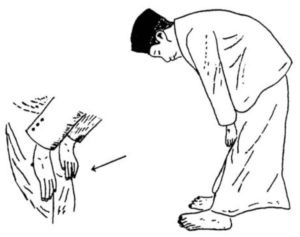
In the Bowing posture, the following Tasbih is recited silently three times:
سُبْحَانَ رَبِّيَ الْعَظِيمِ
Transliteration:
Subhana Rabbiyal ‘Azim.
Translation:
Holy is my Lord, the Most Great.
Then straighten up while reciting Tasmi and stand with arms by your sides.

The Tasmi is recited as follows:
سَمِعَ اللَّهُ لِمَنْ حَمِدَهُ
Transliteration:
Sami‘allahu liman hamidah
Translation:
Allah listens to him who praises Him.
Then recite the Tahmid as follows:
رَبَّنَا لَكَ الْحَمْدُ
Transliteration:
Rabbana walakal-hamd.
Translation:
Our Lord, Thine is the praise, the praise which is bountiful, pure and blessed.
Then say Allahu Akbar again and go into the Prostration position called Sajdah.
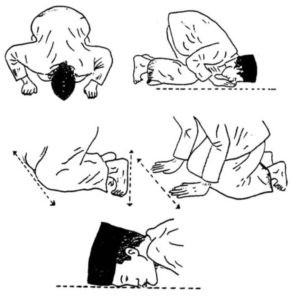
In this posture, your knees, hands, nose, and forehead should be touching the ground. The head should be placed on the ground between the two hands. The arms should be away from the ground and away from your sides. The fingers should be held together pointing towards the Ka‘bah. The feet should be planted on the ground so that the toes are bent in the direction of the Ka‘bah. While in this position, the Tasbih given below should be recited three times.
سُبْحَانَ رَبِّيَ الأَعْلَى
Transliteration:
Subhana Rabbiyal-a‘la.
Translation:
Glory to my Lord, the Most High.
Then say Allahu Akbar again and go into the Sitting position called Jilsah. When sitting in this position, spread your left foot horizontally on the ground and rest on it while the right foot is placed on the ground in a perpendicular position, with the toes facing the Ka‘bah. The hands should be placed on the thighs with the fingers pointing towards the Ka‘bah, very close to the knees.
After Jilsah, do a second Sajdah by saying Allahu Akbar and again recite Subhana Rabbiyal A‘la three times. In every Rak’at of Prayer, there are always two Sajdah. At the end of the second Sajdah, one Rak’at of Prayer is completed. After saying Allahu Akbar once again, go back into the Standing posture to commence the second Rak‘at which is offered exactly as the first Rak’at. However, during the second Rak‘at, Thana and Ta‘awwudh are not recited. Thana’ and Ta‘awwudh are recited only in the first Rak‘at of every Prayer. After completing two Sajdah for the second Rak‘at, sit down in the same manner as Jilsah.
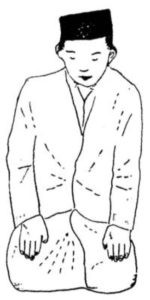
This Sitting Position, at the end of the second Rak‘at is called Qa‘dah. In this position, recite Tashahhud:
التَّحِيَّاتُ لِلَّهِ وَالصَّلَوَاتُ وَالطَّيِّبَاتُ، السَّلاَمُ عَلَيْكَ أَيُّهَا النَّبِيُّ وَرَحْمَةُ اللَّهِ وَبَرَكَاتُهُ، السَّلاَمُ عَلَيْنَا وَعَلَى عِبَادِ اللَّهِ الصَّالِحِينَ، أَشْهَدُ أَنْ لاَ إِلَهَ إِلاَّ اللَّهُ وَأَشْهَدُ أَنَّ مُحَمَّدًا عَبْدُهُ وَرَسُولُهُ
Transliteration:
Attahiyyatu lillahi was-salawatu wat-tayyibatu, Assalamu ‘alaika ayyuhan-Nabiyyu wa Rahmatullahi wa Barakatuh, Assalamu ‘alaina wa ‘ala ibadillahis-Salihin. Ashhadu alla ilaha illallahu wa ashhadu anna Muhammadan ‘abduhu wa Rasuluh.
Translation:
All Salutation is due to Allah and all Prayer and everything pure. Peace be upon thee, O Prophet, and the mercy of Allah and His blessings; and peace be on us and on all righteous servants of Allah. I bear witness that there is none worthy of worship except Allah, and I bear witness that Muhammad is His servant and Messenger.
It should be noted that while reciting Tashahhud, when you reach the phrase Ashhadu alla ilaha illallahu, raise the forefinger of your right hand and drop it down afterwards. The fingers of the left hand should remain straight on the left knee throughout.
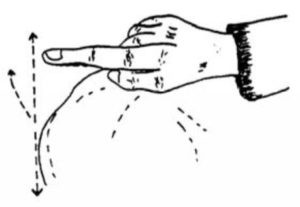
The following points should be noted regarding Qa‘dah:
- If it is the final Qa‘dah, Tashahhud and Durud and some other duas are recited. If it is not the final Qa‘dah, only Tashahhud is recited and after saying Allahu Akbar the next Rak‘at is started.
- If the Prayer being performed is a two Rak‘at Prayer, the Qa‘dah after the second Rak‘at is the final Qa‘dah.
- If it is a three Rak‘at Prayer, the Qa‘dah at the end of the third Rak‘at is the final Qa‘dah.
- If it is a four Rak‘at Prayer the Qa‘dah at the end of the fourth Rak‘at is the final Qa‘dah.
In the final Qa’dah, after reciting Tashahhud, recite Durood-e-Ibrahim as shown below:
Durood-e-Ibrahim
ٱللَّٰهُمَّ صَلِّ عَلَىٰ مُحَمَّدٍ وَعَلَىٰ آلِ مُحَمَّدٍ كَمَا صَلَّيْتَ عَلَىٰ إِبْرَاهِيمَ وَعَلَىٰ آلِ إِبْرَاهِيمَ إِنَّكَ حَمِيدٌ مَجِيدٌ ٱللَّٰهُمَّ بَارِكْ عَلَىٰ مُحَمَّدٍ وَعَلَىٰ آلِ مُحَمَّدٍ كَمَا بَارَكْتَ عَلَىٰ إِبْرَاهِيمَ وَعَلَىٰ آلِ إِبْرَاهِيمَ إِنَّكَ حَمِيدٌ مَجِيدٌ
Transliteration:
Allahumma salli ‘ala Muhammadin wa ‘ala ali Muhammadin kama sallaita ‘ala Ibrahima wa ‘ala ali Ibrahima innaka Hamidum-Majid. Allahumma Barik ‘ala Muhammadin wa ‘ala ali Muhammadin kama Barakta ‘ala Ibrahima wa ‘ala ali lbrahima innaka Hamidum-Majid.
Translation:
Bless, O Allah, Muhammad and the people of Muhammad, as Thou didst bless Abraham and the people of Abraham. Thou art indeed the Praiseworthy, the Glorious. Prosper, O Allah, Muhammad and the people of Muhammad, as Thou didst prosper Abraham and the people of Abraham. Thou are the Praiseworthy, the Glorious.
After Durood-e-Ibrahim, recite a few short duas given below:
رَبَّنَا آتِنَا فِىْ الدُّنْيَا حَسَنَةً وَفِىْ الآخِرَةِ حَسَنَةً وَّقِنَا عَذَابَ النَّارِ
Transliteration:
Rabbana atina fiddunya hasanatan wa fil akhirati hasanatan waqina adhabannar. (2:202)
Translation:
Our Lord, grant us good in this world as well as good in the world to come, and protect us from the torment of the Fire.
رَبِّ اجْعَلْنِي مُقِيمَ الصَّلَاةِ وَمِنْ ذُرِّيَّتِي ۚ رَبَّنَا وَتَقَبَّلْ دُعَاءِ رَبَّنَا اغْفِرْ لِي وَلِوَالِدَيَّ وَلِلْمُؤْمِنِينَ يَوْمَ يَقُومُ الْحِسَابُ
Transliteration:
Rabbij‘alni muqimas-Salati wamin dhur-riyyati. Rabbana wa taqabbal du‘a’. Rabbanaghfir li wali- walidayya wa lil-mu’minina yauma yaqumul hisab. (14:41-42)
Translation:
My Lord, make me observe Prayer, and my children too. Our Lord! bestow Thy grace on me and accept my prayer. Our Lord, grant forgiveness to me and to my parents and to the believers on the day when the reckoning will take place.
After reciting these duas, turn your face towards the right and say Assalamu ‘Alaikum wa Rahmatullah, i.e. peace be upon you and the mercy of Allah, and then turn your face towards the left and repeat Assalamu ‘Alaikum wa Rahmatullah, to mark the end of the Prayer.
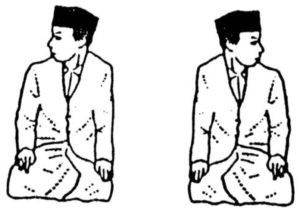
Out of respect for their chastity and honor, women are not allowed to stand for Prayer in front of men. For this reason, the rows of women are always behind the men’s rows. It is preferable, however, to have a separate enclosure for women to pray. Also, a woman cannot lead a congregation of men but can lead a congregation of women.
Women need not say Adhan for their congregational Prayers. The female Imam stands in the middle of the first row, according to common practice, and not ahead of the congregation as in the case of a male Imam. If a female Imam commits a mistake during Prayer, her followers may draw her attention to it by either reciting the verse correctly or by saying Subhanallah.
Salatul-Jumu‘ah or Friday Prayer is offered in congregation. It is offered in place of Zuhr Prayer. Each week on Friday, Muslims are required to take a bath, dress in their best clean clothes, wear perfume and assemble in the mosque for Friday Prayer. The Holy Quran and the Hadith speak highly of the blessings of Jumu‘ah Prayer.
Friday Prayer is obligatory for every adult male Muslim. However, those who are sick, blind or disabled, those on a journey, and women, are exempt from the obligation of attending the Prayer at the mosque. They can join in the Prayer if they so wish, but if they cannot attend the Friday Prayer, they have to offer Zuhr Prayer instead, as the Friday Prayer is offered in place of Zuhr Prayer.
Friday Prayer is an occasion for the assembly of Muslims of a whole city or a town. Getting together once a week develops unity, cooperation, and cohesiveness among Muslims. It also gives the Imam a chance to provide guidance in Islamic teachings and advise all Muslims at the same time. In a large city, Friday Prayer can be offered in more than one place for the convenience of the Muslim community.
There are two Adhans for Friday Prayer. The first Adhan is recited when the sun begins to decline and the second is recited just before the Imam stands up before the congregation to deliver his sermon.
The sermon consists of two parts. In the first part, the Imam advises the gathering to act upon the commandments of Allah and also about the duties they have to perform to become good Muslims. The sermon can also deal with any other matter of importance. This part of the sermon can be delivered in any language. After delivering the first part of the sermon, the Imam sits down for a short while, then stands up again and starts with the second part, which is in Arabic as follows:
اَلْحَمْدُ لِلَّهِ نَحْمَدُهُ وَنَسْتَعِينُهُ وَنَسْتَغْفِرُهُ ، وَنُؤْمِنُ بِهِ ، وَنَتَوَكَّلُ عَلَيْهِ، وَنَعُوذُ بِاللَّهِ مِنْ شُرُوْرِ أَنْفُسِنَا وَمِنْ سَيِّئَاتِ أَعْمَالِنَا ، مَنْ يَهْدِهِ اللهُ فَلَا مُضِلَّ لَهُ ، وَمَنْ يُضْلِلْهُ فَلَا هَادِيَ لَهُ ، وَنَشْهَدُ أَن لَّا إِلَهَ إِلَّا اللهُ وَحْدَهُ لَا شَرِيكَ لَهُ ، وَنَشْهَدُ أَنَّ مُحَمَّدًا عَبْدُهُ وَرَسُولُهُ عِبَادَ اللَّهِ رَحِمَكُمُ اللَّهِ إِنَّ اللَّهَ يَأْمُرُ بِالْعَدْلِ وَ الْإِحْسَانِ وَ ايْتَأَيَّ ذِي الْقُرْبَى وَ يَنْهَى عَنِ الْفَحْشَاءِ وَ الْمُنْكَرِ وَ الْبَغْيِ يَعِظُكُمْ لَعَلَّكُمُ تَذَكَّرُونَ اذْكُرُوا اللهَ يَذْكُرُكُمْ وَادْعُوهُ يَسْتَجِبْ لَكُمُ وَلَذِكْرُ اللَّهِ أَكْبَرُ
Transliteration:
Alhamdu lillahi nahmaduhu wa nasta‘inuhu wa nastaghfiruhu wa nu‘minu bihi wa natawakkalu ‘alaih. Wa na‘udhu Billahi min shururi anfusina wamin sayyi’ati a‘malina. Man-yahdihillahu fala mudilla lahu wa man-yudlilhu fala hadiya lah. Wa nash-hadu alla ilaha illallahu wahdahu la sharika lahu wa nash-hadu anna Muhmmadan ‘abduhu wa Rasuluh. ‘Ibadallahi rahima-kumullah. Innallaha ya’muru bil ‘adli wal-ihsani wa itai’ dhil-qurba, wa yanha ‘anil fahshai’ wal-munkari wal-baghyi, Ya‘izukum la‘allakum tadhakkarun. Udhkurullah yadh-kur-kum wad‘uhu yastajib lakum. Wala Dhikrullahi Akbar.
Translation:
All praise is due to Allah. We laud Him, we beseech help from Him and ask His protection; we confide in Him, we trust Him alone and we seek protection against the evils and mischief of our souls and from the bad results of our deeds. Whomsoever He guides on the right path, none can misguide him; and whosoever He declares misled, none can guide him onto the right path. And we bear witness that none deserves to be worshipped except Allah. He is alone and has no partner. We bear witness that Muhammad is His servant and Messenger. O servants of Allah! May Allah be Merciful to you. Verily, Allah commands you to act with justice, to confer benefits upon each other and to do good to others as one does to one’s kindred and forbids evil which pertain to your own selves and evils which affect others and prohibits revolts against a lawful authority. He warns you against being unmindful. You remember Allah; He too will remember you; call Him and He will make a response to your call. And verily divine remembrance is the highest virtue.
Muslims are required to listen to the sermon attentively. Any type of conversation during the sermon is prohibited. After the Imam has delivered the second part of the sermon, the Iqamah is recited and the Imam leads the congregational two Rak‘at of Jumu‘ah Prayer.
If a person is late for Friday Prayer and joins the congregation in the final Qa‘dah, he should complete his Prayer individually after the Imam has finished leading the Prayer. If, however, he misses the congregational Prayer completely, such a person should offer Zuhr Prayer instead.
After finishing his Prayer, the Holy Prophet ﷺ would sit and recite some of the following duas:
اللَّهُمَّ أَنْتَ السَّلاَمُ وَمِنْكَ السَّلاَمُ تَبَارَكْتَ يَا ذَا الْجَلاَلِ وَالإِكْرَامِ
Transliteration:
Allahumma antas-salamu wa minkas-salamu, tabarakta ya dhal-jalali wal-ikram.
Translation:
O our Lord! Thou art (the embodiment of) peace. And true peace comes from Thee. Blessed art Thou, O Lord of Majesty and Bounty. (Sahih Muslim, Kitabul-Masajid wa mawadhi‘us-Salata, Bab Istihbabu-dhikri ba‘das-Salat)
لاَ إِلَهَ إِلاَّ اللَّهُ وَحْدَهُ لاَ شَرِيكَ لَهُ، لَهُ الْمُلْكُ، وَلَهُ الْحَمْدُ، وَهُوَ عَلَى كُلِّ شَىْءٍ قَدِيرٌ
Transliteration:
La ilaha illallahu wahdahu la sharika lah. Lahul- mulku wa lahul hamd. Wa huwa ‘ala kulli shai’in qadir.
Translation:
There is no one worthy of worship except Allah. He is alone and has no partner. Sovereignty and praise are only for Him and He has full authority over everything.
اللَّهُمَّ أَعِنِّي عَلَى ذِكْرِكَ، وَشُكْرِكَ، وَحُسْنِ عِبَادَتِكَ
Transliteration:
Allahumma a‘inni ‘ala dhikrika wa shukrika wa husni ‘ibadatika.
Translation:
O my Lord, help me so that I can properly perform Thy remembrance and Thy thanksgiving, and that I may worship Thee in the best possible manner.
سُبْحَانَ رَبِّكَ رَبِّ الْعِزَّةِ عَمَّا يَصِفُونَ، وَسَلَامٌ عَلَى الْمُرْسَلِينَ، وَالْحَمْدُ لِلَّهِ رَبِّ الْعَالَمِينَ
Transliteration:
Subhana Rabbika Rabbil ‘izzati ‘amma yasifun, Wa salamun ‘alal-Mursalin, Wal hamdu lillahi Rabbil ‘alamin. (Tirmidhi, Kitabus-Salat, Bab ma Yaqulu idha Sallama)
Translation:
Thy Lord is Holy and clear of all that is alleged against Him (by the non-believers); and He is Exalted. May God’s blessing be upon all Messengers. All praise truly belongs to Allah Who is the Sustainer of all the worlds.
Missed Prayer (Qada)
If you miss the timely performance of a daily Prayer, then such missed Prayers when offered later on are known as Qada Prayers. In such cases, you have to offer the obligatory (Fard) part of the Prayer which have been missed. Whenever a person realizes that he has missed the obligatory Prayers, he should offer them immediately keeping in view the natural sequence of those Prayers.
Sajdah Sahv
If a person commits a mistake during Prayer, which affects the validity of the Prayer, e.g. if he is in doubt whether he has offered the prescribed number of Rak‘at, the Prostrations of condonement (also known as Sajdah Sahv) are necessary.
The Prostrations are offered after the recitation of Tashahhud, Durood, and other duas in the final Qa‘dah of the Prayer. After saying Allahu Akbar, perform two Sajdah, in which Subhana Rabbiyal A‘la is recited three times, then revert back to Qa‘dah position and say Salam to mark the end of the Prayer.
Joining Late
If the Prayer has already started, the latecomer should join in the congregation in the position in which he finds them. For example, if they are in the Standing position, he should start his Prayer in standing position and if they are prostrating, he should join the congregation in prostration.
When the Imam ends the congregational Prayer by saying the Salutation, i.e. Assalamu ‘Alaikum wa Rahmatullah and turning his face towards the right, the person who joined the Prayer later should go into Qiyam position and complete the remaining Rak‘at of his Prayer individually.
Tahajjud Prayer
The Tahujjud prayer is the prayer of the night. The Tahajjud prayer is usually performed after Isha (which is the compulsory nightly prayer) and before performing Fajr (the mandatory morning prayer). Ideally, it is offered during the last third of the night, the time before Fajr. But it can also be offered anytime throughout the night after Isha.
Tahajjud Prayer consists of a minimum of two Rak‘at but can be performed for two, four, six, eight, and twelve Rak‘at. The Holy Prophet ﷺ always offered Tahajjud Prayer, dividing it into two Rak‘at units.
Ishraq Prayer
Ishraq prayer consists of two Rak‘at and is offered after the sun has risen for a while. This prayer is mustahabb (encouraged), not obligatory, and it comes under the larger category of Duha prayer, because the time for Duha prayer lasts from when the sun has risen high until just before the zenith (the time of Zuhr).
Concerning the virtue of Ishraq prayer, the Holy Prophet ﷺ said: “Whoever prays Fajr in congregation, then sits remembering Allah until the sun rises, then prays two rak‘ahs, will have a reward like that of Hajj and Umrah, complete, complete, complete.” [Jami’ al-Tirmidhī, no. 586]
Prayer during Sickness
A sick person who cannot stand for Prayer should offer his Prayer while sitting. If he cannot even sit, he should offer his Prayer while lying down. If he cannot bow down or prostrate, he is allowed to make symbolic gestures to that effect. If he is so sick that he cannot even move his head or hands, he can fulfill this obligation by making gestures in his mind.
Prayer during Travel
If a person is traveling by any means of transportation such that he cannot stand up for Prayer or get out of the moving vehicle, he can offer his Prayer while seated. The condition of facing towards the Qiblah would not be mandatory in this situation. He should face in the direction in which the vehicle, boat or airplane, etc., is moving, if possible.
While on a journey, the number of Fard Rak‘at of Zuhr, Asr, and Isha Prayers are shortened from four to two Rak‘at. If a traveler reaches a place where he intends to stay less than 15 days, then this concession will apply, and he will shorten his Prayers as mentioned above. However, this concession does not apply to the Fard part of the Fajr and Maghrib Prayers.
If a person is staying with a close relative whose house he regards as his own, e.g. his parents’ home, the home of his in-laws, or a religious headquarter such as Makkah, Madinah, etc., he can shorten his Prayer as outlined above but it would be preferable for him to offer the full Prayer as applicable.
While on a journey, the Sunnat Rak‘at of every Prayer is dropped, with the exception of the Vitr Rak‘at in the Isha Prayer and the two Rak‘at Sunnat of the Fajr Prayer.
If travelers are offering their congregational Prayer behind an Imam who is a local resident, they have to follow the Imam. The rule of shortening the Prayer would not apply in that case. But if the person leading the Prayer, i.e. the Imam, is a traveler himself, then he will shorten his Prayer accordingly. The travelers in the congregation will also finish their Prayer with the Imam, while those who are not on a journey will stand up and complete their full Prayer when the Imam has recited the salutations to mark the end of Prayer.
Prayer for Seeking Counsel (Salat-ul-Istikharah)
Salat-ul-Istikharah is a Prayer to seek guidance from Allah when a person intends to begin an important task or project, e.g., trade, journey, marriage, etc. The matter may be religious or otherwise.
A two Rak‘at Prayer is offered, before one goes to bed at night, in which Surah Al-Fatihah is followed by Surah Al-Kafirun in the first Rak‘at and Surah Al- Fatihah followed by Surah Al-Ikhlas in the second Rak‘at. During Qa‘dah position after reciting Tashahhud and Durud and some other Prayers, the following should be recited:
اللَّهُمَّ إِنِّي أَسْتَخِيرُكَ بِعِلْمَكَ، وَأَسْتَقْدِرُكَ بِقُدْرَتِكَ، وَأَسْأَلُكَ مِنْ فَضْلِكَ الْعَظِيمِ، فَإِنَّكَ تَقْدِرُ وَلَا أَقْدِرُ، وَتَعْلَمُ، وَلَا أَعْلَمُ، وَأَنْتَ عَلَّامُ الْغُيُوبِ، اللَّهُمَّ إِنْ كُنْتَ تَعْلَمُ أَنَّ هَذَا الْأَمْرَ- خَيْرٌ لِي فِي دِينِي وَمَعَاشِي وَعَاقِبَةِ أَمْرِي- عَاجِلِهِ وَآجِلِهِ- فَاقْدُرْهُ لِي وَيَسِّرْهُ لِي ثُمَّ بَارِكْ لِي فِيهِ، وَإِنْ كُنْتَ تَعْلَمُ أَنَّ هَذَا الْأَمْرَ شَرٌّ لِي فِي دِينِي وَمَعَاشِي وَعَاقِبَةِ أَمْرِي- عَاجِلِهِ وَآجِلِه
Transliteration:
Allahumma inni astakhiruka bi‘ilmika wa astaqdiruka biqudratika wa as‘aluka min fadlikal ‘azim. Fa innaka taqdiru wala aqdiru, wa ta‘lamu wala a‘lamu wa anta ‘allamul ghuyub. Allahumma in kunta ta‘lamu anna hadhal amra khairun li fi dini wa ma‘ashi wa ‘aqibati amri faqdirhu li wa yassirhu li thumma barik li fih. Wa in kunta ta‘lamu anna hadhal amra sharrulli fi dini wa ma‘ashi wa ‘aqibati amri fasrifhu ‘anni wasrifni ‘anhu, waqdir liyal- khaira haithu kana thumma ardini bih.
Translation:
O Allah, I seek good from Thee out of Thy knowledge and seek power from Thee out of Thy power and I beg of Thee out of Thy boundless Grace, for Thou hast power and I have no power, and Thou hast knowledge and I have no knowledge, and Thy knowledge encompasses the unseen. O Allah! If it be within Thy knowledge that this task is for my good, both materially and spiritually, and in respect of my ultimate end, then make it possible for me and bless me therein, but if it be within Thy knowledge that it is harmful for me in my spiritual and material life and in respect of my ultimate end, then turn me away therefrom, and enable me to attain good wherever it may be and cause me to be blessed therewith. (Bukhari, Kitabud-Da‘wat Babud-Du’a indal Istikharah; Also Tirmidhi; Sharah As-Sunnah Vol. 4, page 153).
Prayer for Seeking Help (Salat-ul-Hajat)
Salat-ul-Hajat is performed when a person is in need or in difficulty. The Holy Prophet ﷺ said that whoever is in need of something should perform Wudu and then offer two Rak‘at. After the Prayer, one should recite Thana, Durud, and the prayer given below. It is hoped that the particular need will be fulfilled and Allah would show the way for the achievement of that goal.
لا إله إلا الله الحليم الكَرِيمُ، سُبْحَاتِ اللهِ رَبِّ الْعَرْشِ الْعَظِيْمِ الْحَمْدُ لِلَّهِ رَبِّ الْعَالَمِينَ ، أَسْأَ لُكَ مُوْجِبَاتِ رَحْمَتِكَ وَعَزَائِمَ مَغْفِرَتِكَ وَالْغَنِيمَةَ مِنْ كُلِّ بِرٍ وَالسَّلَامَة مِنْ كُلِّ اثْمٍ لَّا تَدَهُ فِي ذَنْبًا إِلَّا غَفَرْتَهُ وَلَا هَنَّا إِلَّا فَرَّجْتَهُ وَلَا حَاجَةً لَكَ رِضًا إِلَّا قَضَيْتَهَا يَا أَرْحَمَ الرَّاحِمِينَ. هي
Transliteration:
La ilaha illallahul Halimul Karim, subhanallahi Rabbil ‘arshil ‘azim. Alhamdu lillahi Rabbil ‘alamin. As’aluka mujibati rahmatika wa ‘aza’ima maghfiratika, wal ghanimata min kulli birrin was- salamata min kulli ithm. La tada‘ li dhamban illa ghafartahu wa la hamman illa farrajtahu wa la hajatan hiya laka ridan illa qadaitaha ya Arhamar- Rahimin.
Translation:
There is none worthy of worship except Allah. He is the Compassionate, the Kind. Allah is free of all blemishes and holds the great Heavenly Throne. All praise belongs to Allah alone, Lord of the worlds. Lord! I seek from Thee the instruments of Thy Mercy and the ways and means of Thy forgiveness. I implore Thee to grant me abundantly from Thy virtue and I beg Thee to keep me away from every sin. O Most Merciful God! Eliminate all my sins by forgiving them, and all my grief by dispelling it, and fulfil all my needs which Thou art pleased with.